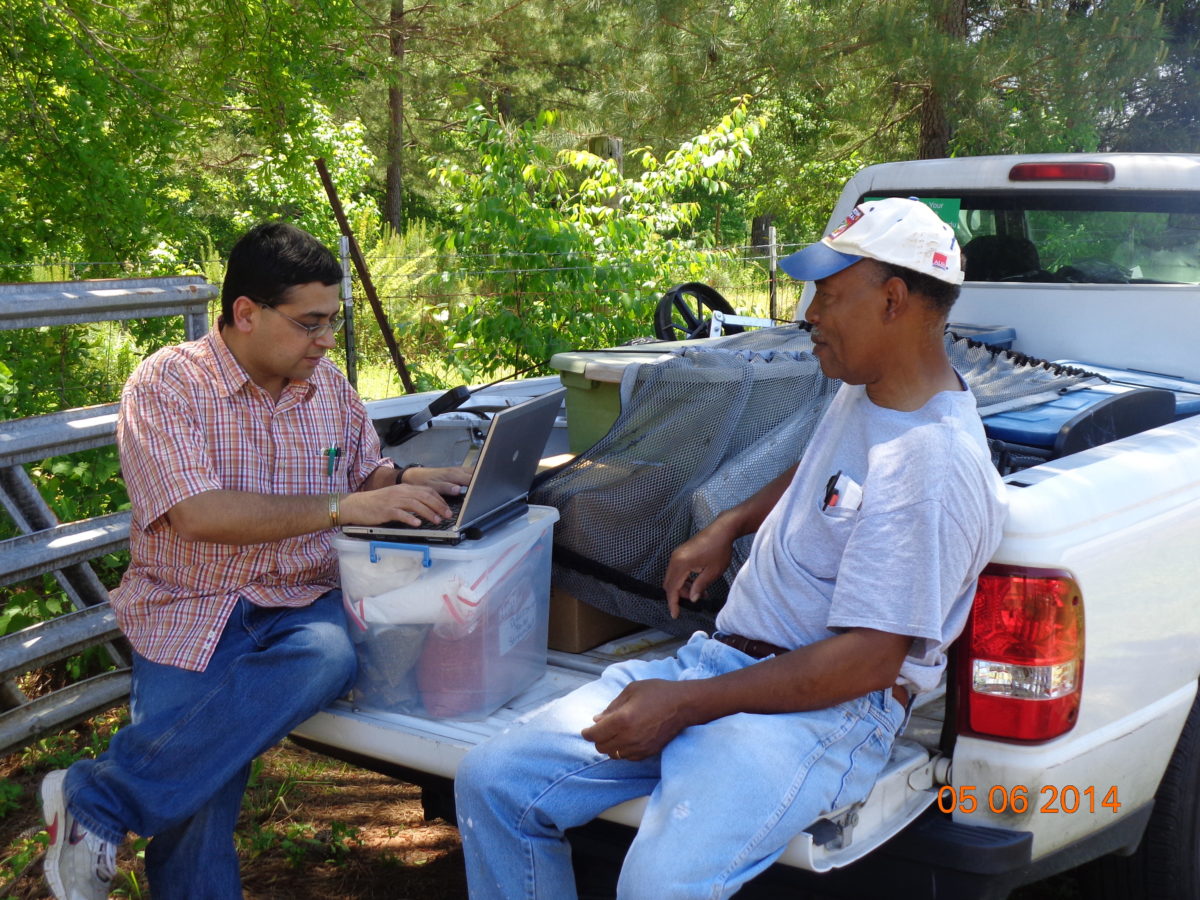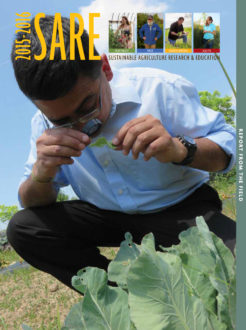SARE: ADVANCING ECOLOGICAL PEST MANAGEMENT
Insect pests love Alabama, with its hot, humid climate and long growing season. For vegetable growers who want to use fewer pesticides but face the risk of major crop losses, and especially for organic growers, who cannot use conventional chemicals at all, pests are a huge problem.
But help is coming in the form of new pest management techniques and improved outreach, being delivered to farmers by Alabama Extension Entomologist Ayanava Majumdar.Video: More on Physical Exclusion Will Mastin describes his experience with shade cloth for physical pest exclusion, and shares some tips.
Physical pest exclusion is one new tool Majumdar is bringing to farmers. Typically accomplished by growing crops inside structures covered with a shade cloth akin to mosquito netting, the strategy showed promise on Will Mastin’s farm, where he tested it in 2013 with a SARE farmer grant. Inside the protected structures he lost less than 20 percent of a tomato crop to pests, whereas in the open field his loss was nearly total.
“We almost don’t even have to worry about caterpillars inside of these structures anymore. It used to be a constant scouting routine,” says Mastin, who grows produce for local markets around Baldwin County. “And so it saves us labor, it saves us pesticide usage and we can focus on planting, harvesting and doing the things that we need to be doing instead of just trying to take care of our crops from the bugs constantly.”
Mastin worked closely on the project with Majumdar. This is one example of how Majumdar is working tirelessly to improve vegetable growers’ ability to deal with pests: He coordinates a program that delivers organic integrated pest management (IPM) information to small-scale farmers through workshops, publications and other outreach. The program is partly funded by SARE through Majumdar’s position as a SARE state coordinator for Alabama.

“It’s incredible because SARE funding has allowed me to develop a new organic movement in research and educational activities, and it’s been incredible because we’ve learned so much in very little time,” Majumdar says.
Since it launched in 2012, Alabama’s organic IPM program has reached nearly 1,000 producers with information that helped them protect crops worth an estimated $2 million statewide. Through surveys, Majumdar found that Alabama vegetable growers who follow organic IPM recommendations can reduce their crop losses by 40-50 percent, significantly boosting their productivity with fewer pesticides.
Alabama’s IPM program emphasizes a three-tier approach to pest management that coincides with USDA organic standards: preventative strategies such as crop rotations, trap crops and sanitation; mechanical and physical control, such as shade cloth exclusion and pest repellents; and biorational pesticides. “The bottom line is, prevention is better than a cure,” Majumdar says.
Majumdar coordinated the shade cloth trial on Mastin’s farm, and has done so on other farms in the state. Mastin used the shade cloth on an existing high tunnel frame to exclude stink bugs, leaf-footed bugs and moths. While the shade cloth protected his crops very well, the strategy comes with some challenges that growers must work out, including ventilation and the exclusion of pollinators and beneficial insects, Mastin says.
Majumdar estimates that producers could expect to spend $250 to $420 to outfit an existing high tunnel with shade cloth, depending on the mesh size. “The cost of the shade cloth has more than paid for itself in the reduction of labor and pesticides that we’ve had to use inside of the structure,” Mastin says.
Learn more about SARE in Alabama.
Free Resources!
SARE bulletins: Trap Cropping in Vegetable Production: One Approach to Managing Pests and High Tunnel Pest Exclusion System (free download).
Conduct topical searches of hundreds of educational resources, including resources for pest management.
